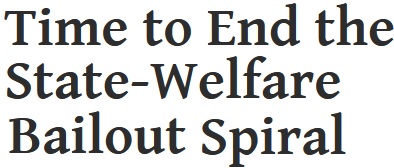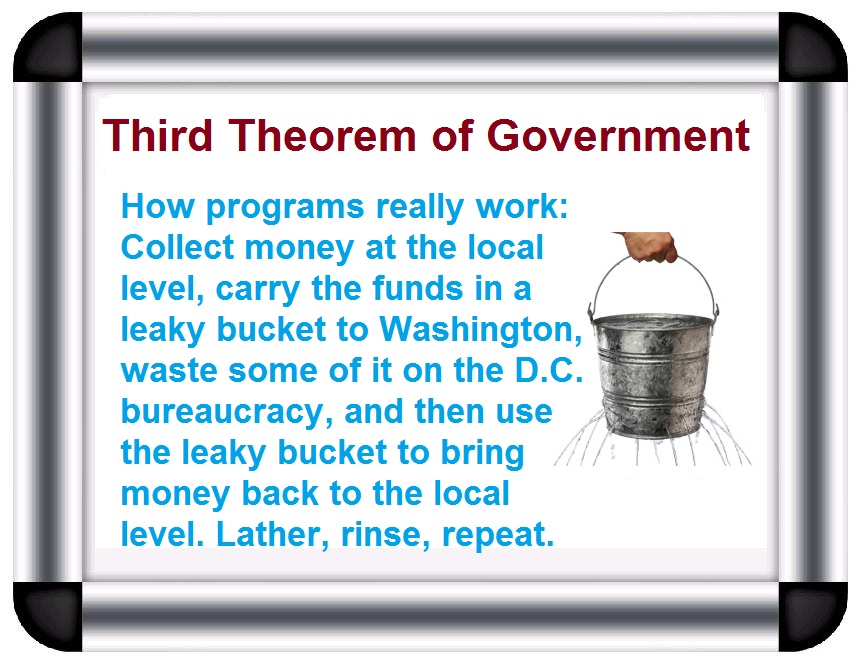I’ve previously explained the difference between entitlement spending and discretionary spending.
I have also explained that entitlements are the main reason the United States faces a very grim fiscal future.
And I’ve specifically written that Medicaid is the entitlement program most in need of reform.
Moreover, I explained in this video that Medicaid’s split-financing model (some of the costs are paid by Washington and some of the costs are paid by states) creates a perverse incentive for politicians to make the program bigger.
The bottom line is that Medicaid needs to be fixed. That being said, not all reform proposals are created equal.
In a column for National Review, Chris Pope of the Manhattan Institute starts by correctly diagnosing the perverse incentives that make Medicaid a fiscal nightmare.
Medicaid now generally provides between $1 and $3 of federal funds for every $1 that states spend on medical services for eligible low-income beneficiaries, offering them an extraordinarily high return on investment. …states have become adept at using Medicaid to harvest federal funds. All 50 states now tax hospitals and other medical providers to inflate the matching aid they can claim from the federal government… When Medicaid caseloads decline during economic upturns, states have tended to expand benefit packages and loosen eligibility criteria — relying on Congress to provide ad hoc bailouts when expenses spike in subsequent recessions.
Amen.
I’m particularly disgusted that the system rewards states for taxing healthcare providers (who largely like the system because the taxes are less than the extra money they get from the added Medicaid spending).
But my enthusiasm for his article evaporated when he said the solution is to put Washington completely in charge.
America’s state governments are currently flush with funds and expanding their spending commitments. …This dynamic — of states overextending themselves in healthy fiscal times and then relying on national bailouts when the business cycle takes a downturn — has become characteristic of modern American federalism. …Should a future recession necessitate another round of bailouts, the federal government should assume full financial and operational responsibility by nationalizing currently split entitlement programs. Federal legislation already mandates most details of basic Medicaid benefits and eligibility, as well as providing 70 percent of funding. …Entitlements can be provided most robustly and cost-effectively if they are administered and financed nationally. As with Medicare and Social Security, this would make programs easier for Congress to control, avert the need for bailouts of states in recessions, and eliminate the ability of politicians to overextend programs by shifting costs to taxpayers outside their states.
The author is almost surely right that a federal takeover would produce better outcomes than the current hybrid system.
But an even better option would be complete decentralization. The federal portion of Medicaid spending should be turned into “block grants,” meaning states would simply get a pile of money and they can then decide how best to provide health care to lower-income people.
Under that kind of system, we’d get innovation, with states learning from each other (and also competing with each other).
That certainly would produce better long-run outcomes than a one-size-fits-all Washington entitlement.
I’ll close by noting that this is not some sort of risky or untested notion. Bill Clinton’s welfare reform replaced a federal entitlement with a block grant and that was very successful.
P.S. Ultimately, of course, block grants should be phased out as part of a comprehensive federalism agenda (including big tax cuts). Then states can choose how much to tax and how much to spend. Just like the Founding Fathers intended.
P.P.S. I write about “Fiscal Fights with Friends” when I think someone is well meaning but is pushing subpar policy. Previous editions have focused on tax increases, parental leave, the value-added tax, fiscal policy, the flat tax, and the carbon tax (twice).
———
Image credit: http://401kcalculator.org | CC BY-SA 2.0.




